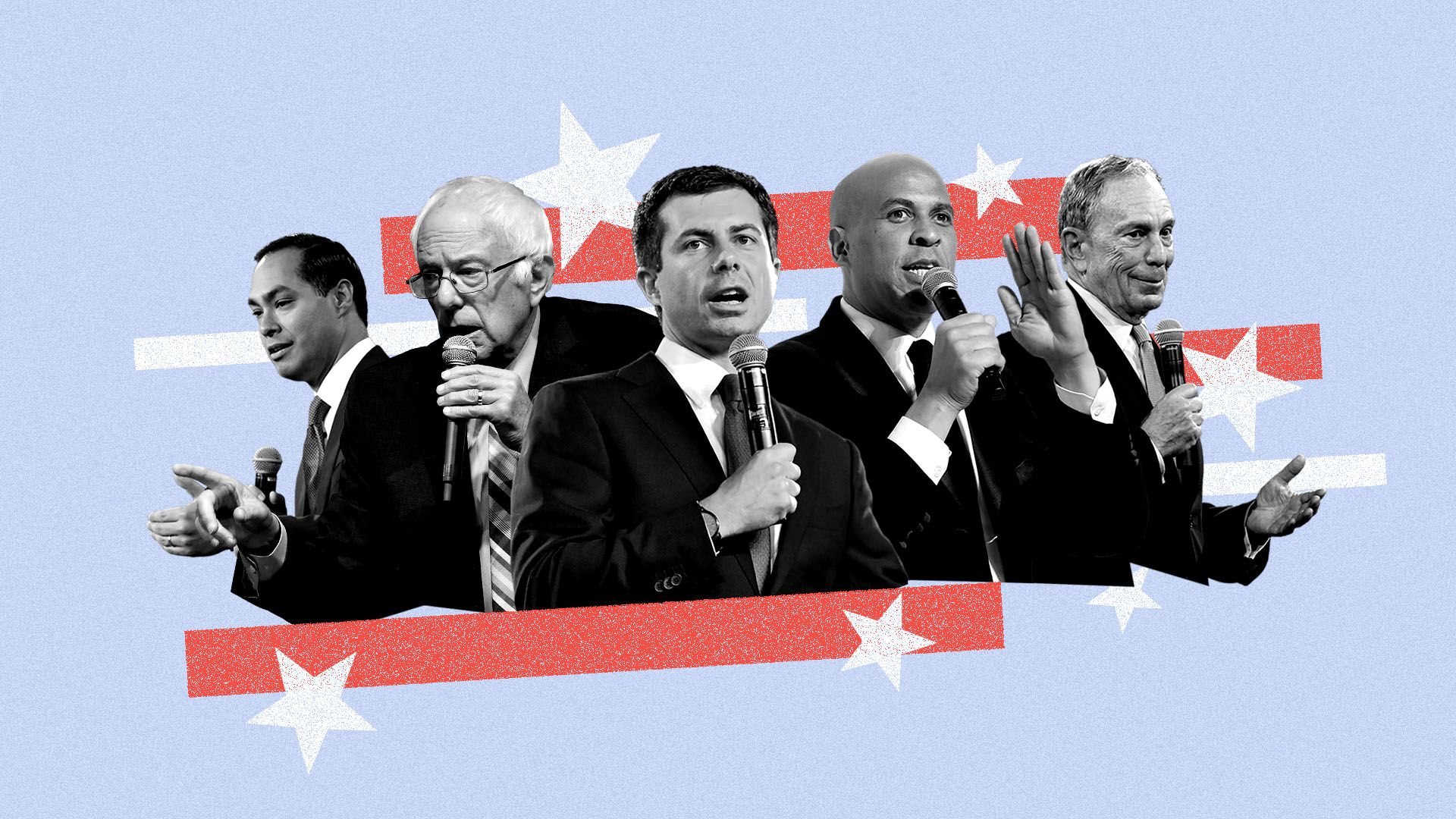Why 2020 has become the mayors' race
Add Axios as your preferred source to
see more of our stories on Google.

Photo Illustration: Sarah Grillo/Axios. Photos by Ethan Miller/Getty Images, Photo by Paras Griffin/WireImage, Paul Morigi/Getty Images, Mandel Ngan/AFP via Getty Images, and Kevin Mazur/Getty Images for Robin Hood
The 2020 Democratic field has more mayors and former mayors than any other presidential primary in recent memory, reflecting a hope that voters will want local leaders' practical, on-the-ground experience after four years of President Trump.
Why it matters: While public trust in Washington and Congress has hit record lows, city and local elected leaders enjoy more public trust and tend to be viewed as less partisan and ideological than those in national office.
Mayors face real-time accountability for their actions while, for example, shopping for milk or filling up at the gas station — a closer-to-the-people dynamic that appeals to many voters.
- Two thirds of U.S. adults think local elected officials care about the people they represent "all or most" (14%) or "some of the time" (53%), per Pew Research Center. Just half say the same about members of Congress.
- The catch: Only two — South Bend Mayor Pete Buttigieg and former Burlington Mayor Bernie Sanders — have shown enough polling strength to be considered in the top tier.
Driving the news: Former three-term New York City Mayor Michael Bloomberg officially jumped into the race on Sunday with a self-funded campaign that will depict him as a disciplined, pragmatic leader.
Bloomberg joins several other former mayors in the race: Buttigieg, Sanders, former Newark Mayor Cory Booker, and former San Antonio Mayor Julian Castro.
- Other candidates with stints as mayors — John Hickenlooper was a two-term mayor of Denver; Bill de Blasio is New York's current mayor — have dropped out of the race.
Buttigieg is surging in Iowa polls, but has been the target of criticism from rivals who say he doesn't have enough experience to take on the presidency. At 37, he would be the youngest person to be elected president.
- "Washington experience is not the only experience that matters," he fired back at questions about his level of experience during last week's debate."There's more than 100 years of Washington experience on this stage, and where are we right now as a country?"
Bloomberg is already being criticized for his billionaire status. The former Republican is an influential force in cities through his Bloomberg Philanthropies' American Cities Initiative, which lends financial support and expertise to address urban challenges like climate change and public transportation.
- Bloomberg is known for reducing crime, improving transportation and helping to rebuild after 9/11. But he's also blamed for increased gentrification and income inequality in his hometown.
- “He’s fearless. He’s data driven. He’s objective, and right now in the world, he’s probably doing as much for cities as any individual is with his Bloomberg Foundation and its support of cities," said Austin Mayor Steve Adler in a Texas Monthly podcast this month.
- Yes, but: Adler added he doesn't foresee Bloomberg becoming the nominee: "I think somebody like Mayor Pete represents the call for the next generation of leadership, and I think that he would garner greater excitement and intensity. But I have a lot of respect for Mayor Bloomberg.”
Castro became the youngest member of Barack Obama's Cabinet when he was appointed Housing and Urban Development secretary in 2014. He has a strong connection to Latino voters, but failed to meet the polling and fundraising threshold to qualify for last week's debate.
- He told Axios he's working hard to qualify for the December debate, and acknowledged his weaker name recognition compared to opponents.
- When asked why he thought so many mayors are running, he said: "It's because people know that local government is where things actually get done, and [mayors] are at the nexus of public service and productivity."
- When people "compare that to Donald Trump, they see this guy has been so ineffective, so in over his head," he continued. "It's no surprise there are a number of mayors and former mayors who are in the race."
What they're saying: When asked about the high mayoral participation this cycle, Los Angeles Mayor Eric Garcetti pointed out that big-city mayors in other countries often become heads of state because the position is seen as "chief executive training ground." Plus, the majority of Americans now live in cities, both large and small.
- "People are recognizing that somebody coming out of Washington doesn't always have the freshest perspective," Garcetti told Axios at the National League of Cities City Summit last week. "I think absolutely a mayor can be president, but that doesn't mean they will."
Go deeper:
